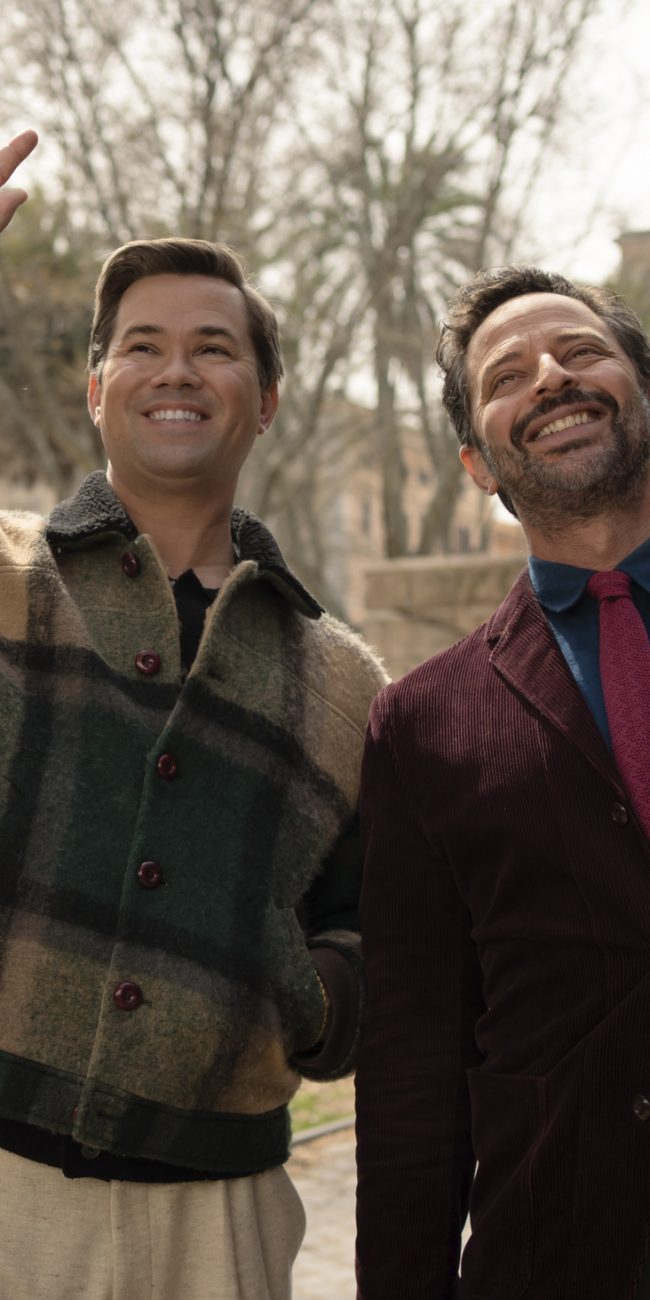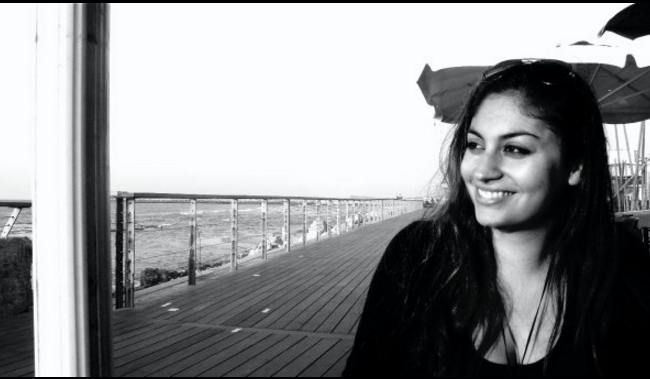A Conversation with Leni Huyghe & Leonie Buysse (REAL FACES)
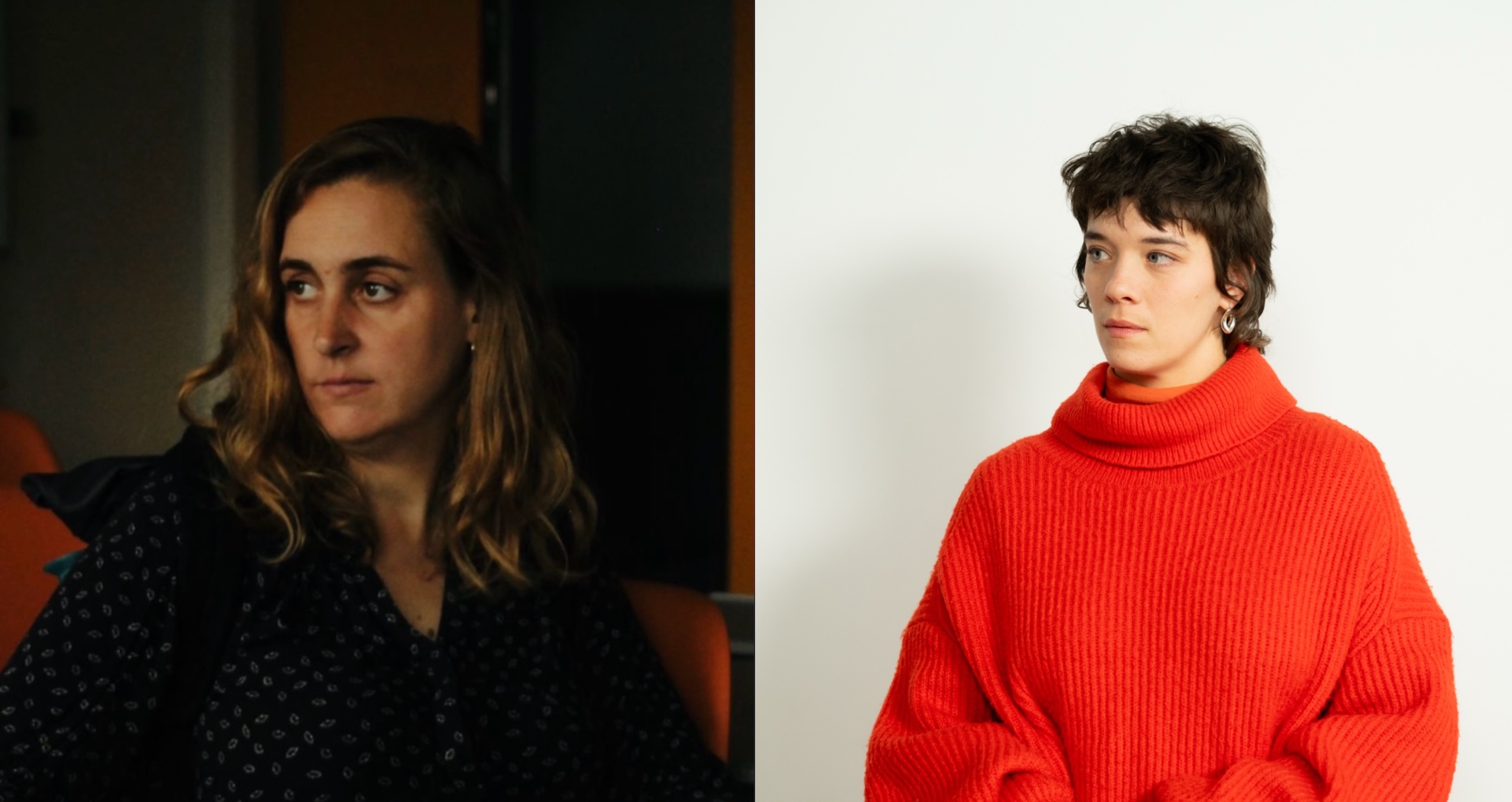
Belgian director Leni Huyghe just premiered her debut feature, Real Faces, at SXSW 2025 (where I reviewed it). The film follows its two protagonists, Julia (Leonie Buysse) and Eliot (Gorges Ocloo), as they separately and together navigate conflicts on their road to self-actualization. Julia works as a casting agent for a perfume commercial and Eliot is a lichenologist working on his Ph.D. A film that combines satire with moving and genuine sentiment, Real Faces features great performances and sharp mise-en-scène. I had a chance to speak with both Huyghe and Buysee via Zoom during SXSW, and what follows is that interview, edited for length and clarity. Their English is good, though I have adjusted phrases here and there to better fit American idioms.
Hammer to Nail: Leni, what was the origin of the story for you? Did you start with the main character or build the world first, or did everything just evolve together?
Leni Huyghe: I started writing from really personal experiences and dealing with the audiovisual sector myself, this industry where you have this contradiction with your creativity and you sometimes see things happening that are really not OK and out of line. I wanted to speak about that from the very beginning, but also wanted to address being at a point in your life where you’re still really searching for who you want to be. The film for me started with a quote I had read in a book by Zygmunt Bauman, called Liquid Modernity: “Hell is not something that will be but is something that is here already, created by us living together. And what is important for humans these days is to see what is not hell and to find space and grow.” And I loved that quote. We live in this capitalist society that is very destructive in a way and can be very violent.
HtN: That’s a great quote. So, Leonie, if I may ask you, how did Leni approach you with this role? Did you audition?
Leonie Buysse: We know each other through common friends. We had met each other before in just a social context. I think Leni just wrote me an email, contacted me with the script, asked me if I would be interested. (turns to Leni) You might’ve seen one of my performances, or not. And I read it and then we had a Zoom call about it because it was during Covid, so we couldn’t actually meet. And we talked about the character of Julia a lot, and how I could relate to also coming to this big city. I mean for Belgium, Brussels is quite a big city. And relating to this feeling of loneliness. I think I had also just split up with a partner. And I think from there we started developing this character and talking a lot about what her motivations were. There was no actual audition, which was very nice for me.
HtN: (to Leonie) There’s a line that the sleazy director, David, says to you at one party, when he’s trying to pick you up. He says, “You have a Marion Cotillard thing going on.” Was that an improvised line, because maybe you do have a little resemblance to Cotillard, or was that in the script?
LB: That’s not improvised. That was in the script. I get that one a lot.
HtN: So most of the characters in the film speak French, though there is obviously a good deal of Dutch, as well, and sometimes English as a common language. For example, Elliot doesn’t appear to speak French, so he speaks English as a common language. How does the language breakdown work in Belgium, more or less, in terms of how many people speak French and how many people speak Dutch?
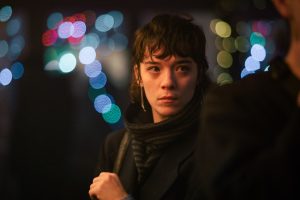
Leonie Buysse in REAL FACES
LH: I feel that as a Flemish person, when I moved to Brussels, I couldn’t quite express myself in Dutch because for the most part in Brussels, if you live there, you will have your interactions in French, unless you work for big corporations, but in the streets when you go get a sandwich or a coffee, you’re speaking French. But then there are so many different communities coming together in Brussels that on the street you might hear many different languages. So it is mixed. There is such a mingling of languages and cultures together.
HtN: Well, it’s the European capital, so that makes sense. So, the commercial that David, the director in the film, is putting together seems particularly awful. It’s like the worst kind of pseudo-artistic stuff that actual perfume companies put out, but it takes a lot of work to make something that is bad. What was your inspiration as you designed that commercial?
LH: I had so much fun with that. We had a lot of people coming together to think about this line and that and think about what would be edgy today to reach an audience. And I thought, “OK, it can be poetic but dark and we’re going to shoot it maybe on film and we are going to represent the city and we need real faces for this.” And then, also, I love perfume advertisements. How many times did I watch the Kenzo advertisement by Spike Jonze because it’s so visceral … And then I also studied these Armani perfume ads from the ‘90s that are so bad, they’re so violent. It’s actually rape culture: you have a woman and a guy—it’s also very binary—and then she’s like, “Oh yeah, let’s go to the toilet.” I mean, in Brussels for instance, we have so many rape cases, and I think it comes from this mentality that anything is possible if a woman just looks in your direction. I think I also wanted to speak about the violence of perfume ads.
HtN: And certainly, what Julia is being asked to make people do in the auditions is very disturbing. Speaking of those people, were any of those just people off the street or was everyone in the film an actor to some degree?
LH: No, it was really constructed, but constructed organically, as it was a low-budget film and you often have to work through and through. Many of these actors came through the casting, the casting that we were doing for some of the characters that had dialogue. You see so many interesting people and they stay in mind. I really love the casting process and even if they’re not a good fir for a character, I keep them in mind for something else. And of course I wanted to represent some of the communities in Brussels, so I was very aware of picking different people and personalities, of course, some who were more introverted, some more expressive, to have this combination of people that you could encounter. So yeah, it was an interesting process, but definitely not one that had very clear lines.
HtN: In the press notes, you talk about improvisation as part of the process. And so I’m curious, Leonie, if any of what was happening in those interactions, whether in the auditions or on the street, even if it was constructed, was all scripted or were you improvising at all? It feels very organic, all of those interactions.
LB: Most of it was scripted, actually. But then when we were doing the audition tapes with David’s questionnaire, they had an option to choose if they would respond to these questions as themselves or create a persona and respond from that point of view. And I think most of them—I mean this was a very heavy day onset emotionally I would say—blurted out this beautiful answer that was so touching. But luckily there was text then for me to go back to and hold on to that because sometimes I was really flabbergasted with what came up.
LH: We had the conversation before on the set with all of them, so they had time to think about it. And they were very vulnerable in their answers, very real in their answers. And it was very important for me to have that part. And then of course we watched the film afterwards to make sure that everyone was OK. (to Leonie) But you were also, for instance, improvising on the street.
LB: Yeah, I think I did that on kind of an adrenaline shot. I don’t really remember anymore. But what was also very nice about Grimm [Vandekerckhove, the cinematographer] was that he really follows you so well, and there’s this complete trust that whatever I do, he will be there to capture it. So he’s very attentive to this and it gave me a lot of freedom in playing as an actor, which was super nice.
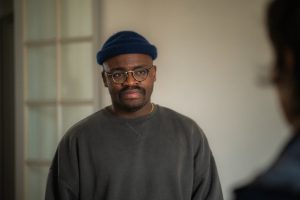
Gorges Ocloo in REAL FACES
HtN: I’m glad you mentioned the cinematographer, because his work is really quite something. I want to ask about the casting of Eliot. How did you cast Gorges Ocloo?
LH: I had seen him at a theater festival, where he had done a performance where he also addressed issues in the theater sector that were similar to what I was addressing in the script. So that’s why I wanted to have a conversation where we sat down close to his house in a bar. And I think that conversation lasted for three hours. When I meet people in a conversation, I’m also sort of looking at who they are and how they speak. And Gorges has this very soft way of addressing things which was really interesting. So I needed that for the character and that made sense. He made sense for the character that we had built. But because we’re also talking about microaggressions—aggressions, for instance, that I don’t experience myself, since even if I experience them as a woman, I don’t experience them as a woman of color—I wanted to have the conversation to make sure that it felt true to him to play it. And at the same time also for him to get in character as this lichen specialist. So we went two days to the plant center, which is also the place where we shot the film. It was very good to have these conversations before we started filming.
HtN: Speaking of the lichen, I love that digital effect you have of the lichen growing in the apartment spaces. How did you land on that device?
LH: When I was going through a bad time with my partner, I went to Versailles and I saw these spots on this stone fountain. I stared at them for a long time and combined that with a dread of life and how that compares to these lichens that have been there millions of years, from the very beginning, and managed to form a symbiotic relationship with something. It helped to build Eliot’s character even more because we already knew who he was, but he had at that time a different job. And I have to add that on a personal level, I was also in a relationship with a scientist, myself, and was interested in exploring these very opposing worlds. I’m always drawn to that, the things that you don’t understand and that you don’t have the mindset for, but still have those conversations about them.
HtN: Final question … how did you cast the cat, Wasabi?
LH: It was very simple. We were on a low budget and couldn’t hire an animal handler. So I asked, “Who in the crew has a cat?” And the line producer had one so we cast her cat.
HtN: Thank you for talking to me. I wish you all good things with the film.
LH/LB: Thank you.
– Christopher Llewellyn Reed (@ChrisReedFilm)








